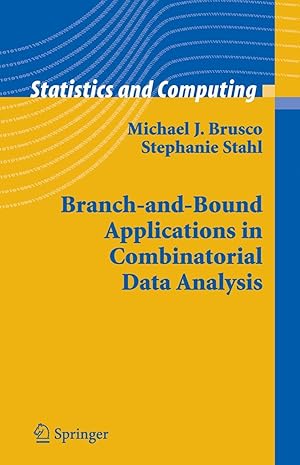branch and bound applications combinatorial data von brusco michael (7 Ergebnisse)
Suchfilter
Produktart
- Alle Product Types
- Bücher (7)
- Magazine & Zeitschriften (Keine weiteren Ergebnisse entsprechen dieser Verfeinerung)
- Comics (Keine weiteren Ergebnisse entsprechen dieser Verfeinerung)
- Noten (Keine weiteren Ergebnisse entsprechen dieser Verfeinerung)
- Kunst, Grafik & Poster (Keine weiteren Ergebnisse entsprechen dieser Verfeinerung)
- Fotografien (Keine weiteren Ergebnisse entsprechen dieser Verfeinerung)
- Karten (Keine weiteren Ergebnisse entsprechen dieser Verfeinerung)
- Manuskripte & Papierantiquitäten (Keine weiteren Ergebnisse entsprechen dieser Verfeinerung)
Zustand Mehr dazu
- Neu (5)
- Wie Neu, Sehr Gut oder Gut Bis Sehr Gut (Keine weiteren Ergebnisse entsprechen dieser Verfeinerung)
- Gut oder Befriedigend (1)
- Ausreichend oder Schlecht (Keine weiteren Ergebnisse entsprechen dieser Verfeinerung)
- Wie beschrieben (1)
Einband
- alle Einbände
- Hardcover (7)
- Softcover (Keine weiteren Ergebnisse entsprechen dieser Verfeinerung)
Weitere Eigenschaften
- Erstausgabe (Keine weiteren Ergebnisse entsprechen dieser Verfeinerung)
- Signiert (Keine weiteren Ergebnisse entsprechen dieser Verfeinerung)
- Schutzumschlag (Keine weiteren Ergebnisse entsprechen dieser Verfeinerung)
- Angebotsfoto (3)
Sprache (1)
Gratisversand
Land des Verkäufers
Verkäuferbewertung
-
gebundene Ausgabe. Zustand: Gut. 221 Seiten Der Erhaltungszustand des hier angebotenen Werks ist trotz seiner Bibliotheksnutzung sehr sauber und kann entsprechende Merkmale aufweisen (Rückenschild, Instituts-Stempel.). In ENGLISCHER Sprache. Sprache: Englisch Gewicht in Gramm: 480.
-
Branch-And-Bound Applications In Combinatorial Data Analysis
Buch 10 von 27: Statistics and ComputingAnbieter: Romtrade Corp., STERLING HEIGHTS, MI, USA
Zustand: New. This is a Brand-new US Edition. This Item may be shipped from US or any other country as we have multiple locations worldwide.
-
Branch-and-Bound Applications in Combinatorial Data Analysis.
Buch 10 von 27: Statistics and ComputingAnbieter: Universitätsbuchhandlung Herta Hold GmbH, Berlin, Deutschland
XII, 221 p. Hardcover. Versand aus Deutschland / We dispatch from Germany via Air Mail. Einband bestoßen, daher Mängelexemplar gestempelt, sonst sehr guter Zustand. Imperfect copy due to slightly bumped cover, apart from this in very good condition. Stamped. Statistics and Computing Sprache: Englisch.
-
Branch-And-Bound Applications In Combinatorial Data Analysis (Statistics And Computing)
Buch 10 von 27: Statistics and ComputingAnbieter: Romtrade Corp., STERLING HEIGHTS, MI, USA
Zustand: New. This is a Brand-new US Edition. This Item may be shipped from US or any other country as we have multiple locations worldwide.
-
Branch-and-bound Applications In Combinatorial Data Analysis (statistics And Computing
Buch 10 von 27: Statistics and ComputingAnbieter: Romtrade Corp., STERLING HEIGHTS, MI, USA
Zustand: New. This is a Brand-new US Edition. This Item may be shipped from US or any other country as we have multiple locations worldwide.
-
Branch-And-Bound Applications in Combinatorial Data Analysis
Buch 10 von 27: Statistics and ComputingAnbieter: AHA-BUCH GmbH, Einbeck, Deutschland
Buch. Zustand: Neu. Druck auf Anfrage Neuware - Printed after ordering - This monograph focuses on the application of the solution strategy known as branch-and-bound to problems of combinatorial data analysis. Combinatorial data analysis problems typically require either the sel- tion of a subset of objects from a larger (master) set, the grouping of a collection of objects into mutually exclusive and exhaustive subsets, or the sequencing of objects. To obtain verifiably optimal solutions for this class of problems, we must evaluate (either explicitly or implicitly) all feasible solutions. Unfortunately, the number of feasible solutions for problems of combinatorial data analysis grows exponentially with pr- lem size. For this reason, the explicit enumeration and evaluation of all solutions is computationally infeasible for all but the smallest problems. The branch-and-bound solution method is one type of partial enume- tion solution strategy that enables some combinatorial data analysis pr- lems to be solved optimally without explicitly enumerating all feasible solutions. To understand the operation of a branch-and-bound algorithm, we d- tinguish complete solutions from partial solutions. A complete solution is one for which a feasible solution to the optimization problem has been produced (e. g. , all objects are assigned to a group, or all objects are - signed a sequence position). A partial solution is an incomplete solution (e. g. , some objects are not assigned to a group, or some objects are not assigned a sequence position).
-
Branch-and-Bound Applications in Combinatorial Data Analysis
Buch 10 von 27: Statistics and ComputingAnbieter: moluna, Greven, Deutschland
EUR 136,76
EUR 48,99 shipping
Versand von Deutschland nach USAAnzahl: Mehr als 20 verfügbar
In den WarenkorbGebunden. Zustand: New. This book provides clear explanatory text, illustrative mathematics and algorithms, demonstrations of the iterative process, pseudocode, and well-developed examples for applications of the branch-and-bound paradigm to important problems in combinatorial .





